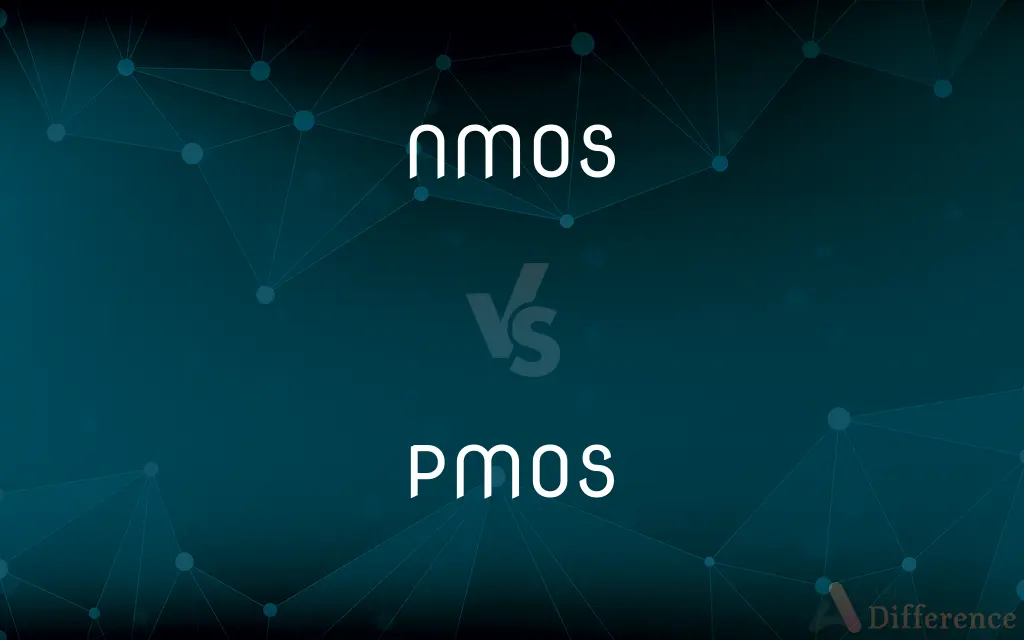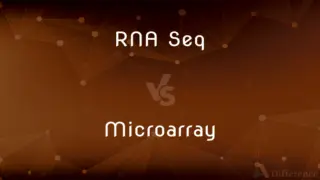NMOS vs. PMOS — What's the Difference?
By Tayyaba Rehman — Published on December 15, 2023
NMOS transistors use electrons for conduction, are faster but consume more power, while PMOS transistors use holes, are slower but consume less power.

Difference Between NMOS and PMOS
Table of Contents
ADVERTISEMENT
Key Differences
NMOS and PMOS are two fundamental types of MOSFET (Metal-Oxide-Semiconductor Field-Effect Transistor) technologies used in digital circuits. While both are integral to CMOS technology, they possess distinctive characteristics.
NMOS transistors are typically faster than PMOS transistors. This speed advantage is because electrons, which are the charge carriers for NMOS, have higher mobility compared to holes, the charge carriers for PMOS.
Despite its speed, NMOS has a drawback. When compared to PMOS, NMOS transistors generally consume more power. This increased power consumption can lead to challenges in power-sensitive applications.
On the other hand, PMOS transistors, due to their use of holes as charge carriers, tend to be slower. However, PMOS offers the advantage of consuming less power than NMOS, making them desirable in power-efficient designs.
In digital logic design, a combination of both NMOS and PMOS (known as CMOS) is commonly used. This approach leverages the strengths of both types, creating circuits that are both power-efficient and high-speed.
ADVERTISEMENT
Comparison Chart
Charge Carrier
Electrons
Holes
Speed
Generally faster
Generally slower
Power Consumption
Higher
Lower
Threshold Voltage
Positive
Negative
Symbol Polarity
Often represented with an arrow pointing out
Often represented with an arrow pointing in
Compare with Definitions
NMOS
NMOS is faster due to the high mobility of electrons.
For the timing-critical section, the designer chose NMOS transistors.
PMOS
PMOS operates with a negative threshold voltage.
The PMOS transistor switched on when the negative voltage threshold was reached.
NMOS
NMOS transistors are integral in CMOS technology.
The NMOS components were paired with PMOS for efficient operation.
PMOS
PMOS offers the benefit of lower power consumption.
The device had a longer battery life due to its PMOS architecture.
NMOS
NMOS typically consumes more power than PMOS.
The battery drained quickly due to the NMOS design of the chip.
PMOS
PMOS is generally slower than NMOS in operation.
The clock speed was limited by the PMOS transistors in the pathway.
NMOS
NMOS operates with a positive threshold voltage.
The NMOS transistor activated when a positive voltage was applied.
PMOS
PMOS is a MOSFET type that uses holes as charge carriers.
The PMOS design was chosen for its power efficiency.
NMOS
NMOS is a type of MOSFET using electrons as charge carriers.
The high-speed operation of the circuit was attributed to the NMOS transistors.
PMOS
PMOS transistors are often used alongside NMOS in digital circuits.
The chip combined both PMOS and NMOS for balanced performance.
Common Curiosities
Which transistor consumes more power, NMOS or PMOS?
NMOS generally consumes more power than PMOS.
Why are both NMOS and PMOS used together in circuits?
Combining both utilizes the speed of NMOS and the power efficiency of PMOS, leading to efficient digital circuits.
Why is power consumption a concern with NMOS?
Higher power consumption leads to more heat and can drain batteries in portable devices.
How do the threshold voltages of NMOS and PMOS differ?
NMOS has a positive threshold voltage, while PMOS has a negative one.
Is CMOS a combination of NMOS and PMOS?
Yes, CMOS stands for Complementary Metal-Oxide-Semiconductor, combining both types.
Are NMOS transistors more common than PMOS?
Both are equally prevalent, especially in CMOS technology where they complement each other.
What are NMOS and PMOS transistors?
Both are types of MOSFETs, with NMOS using electrons and PMOS using holes for conduction.
Is NMOS faster than PMOS?
Yes, NMOS is typically faster due to the higher mobility of electrons.
What charge carriers do PMOS transistors use?
PMOS transistors use holes as charge carriers.
Do NMOS and PMOS look different in circuit symbols?
Yes, NMOS usually has an arrow pointing out, while PMOS has an arrow pointing in.
Which transistor is better for power-sensitive applications?
PMOS is preferred due to its lower power consumption.
Can a circuit work with only NMOS transistors?
While possible, it's not common due to power inefficiencies. CMOS, a combination of NMOS and PMOS, is more typical.
Are there any other types of MOSFETs besides NMOS and PMOS?
Yes, there are variations like Depletion-mode MOSFETs, but NMOS and PMOS are the primary types for digital circuits.
What are the advantages of CMOS technology?
CMOS offers the benefits of high-speed operation (from NMOS) and low power consumption (from PMOS).
How has CMOS technology impacted the electronics industry?
CMOS has become the dominant technology for integrated circuits due to its efficiency, driving advancements in electronics.
Share Your Discovery

Previous Comparison
Forward Contract vs. Futures Contract
Next Comparison
RNA Seq vs. MicroarrayAuthor Spotlight
Written by
Tayyaba RehmanTayyaba Rehman is a distinguished writer, currently serving as a primary contributor to askdifference.com. As a researcher in semantics and etymology, Tayyaba's passion for the complexity of languages and their distinctions has found a perfect home on the platform. Tayyaba delves into the intricacies of language, distinguishing between commonly confused words and phrases, thereby providing clarity for readers worldwide.












































